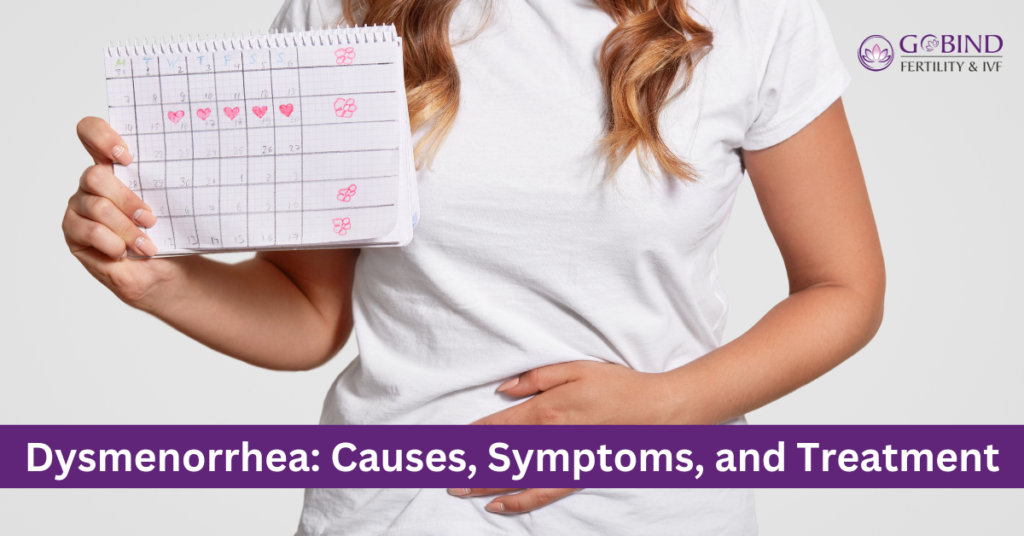Dysmenorrhea: Causes, Symptoms, and Treatment

Dysmenorrhea, commonly known as menstrual cramps, is a prevalent condition that affects many women during their reproductive years. Characterized by painful menstruation, dysmenorrhea can significantly impact a woman’s quality of life, affecting daily activities and overall well-being. Understanding its causes, symptoms, and treatment options is crucial for effective management.
Causes
Dysmenorrhea is classified into two main types: primary and secondary.
1. Primary Dysmenorrhea
Prostaglandins: The primary cause of dysmenorrhea is the overproduction of prostaglandins, hormone-like substances that trigger uterine muscle contractions. These contractions help shed the uterine lining but can cause pain when excessive.
Genetics: A family history of dysmenorrhea can increase the likelihood of experiencing menstrual cramps.
2. Secondary Dysmenorrhea
Endometriosis: A condition where tissue similar to the uterine lining grows outside the uterus, causing severe pain.
Fibroids: Noncancerous growths in the uterus that can cause heavy and painful menstruation.
Adenomyosis: A condition where the uterine lining grows into the muscular wall of the uterus, leading to painful periods.
Pelvic Inflammatory Disease (PID): An infection of the reproductive organs that can cause severe menstrual pain.
Intrauterine Device (IUD): Certain types of IUDs can cause increased menstrual pain.
Dysmenorrhea Symptoms
The primary symptom of dysmenorrhea is pain, which can vary in intensity and duration. Common symptoms include:
Cramping Pain: Typically in the lower abdomen, but it can also radiate to the lower back and thighs.
Throbbing or Aching Pain: Can range from mild to severe, often starting 1-2 days before menstruation and lasting 2-4 days.
Nausea and Vomiting: Some women experience gastrointestinal symptoms along with menstrual pain.
Fatigue: Feeling unusually tired during menstruation.
Headaches and Dizziness: Accompanying symptoms that can exacerbate discomfort.
Dysmenorrhea Treatment
Management of dysmenorrhea includes lifestyle changes, medication, and, in some cases, surgical interventions. Treatment options vary based on the severity of symptoms and the underlying cause.
1. Lifestyle Modifications
Exercise: Regular physical activity can help reduce the severity of menstrual cramps.
Heat Therapy: Applying a heating pad or hot water bottle to the lower abdomen can provide relief from pain.
Dietary Changes: Reducing caffeine and salt intake, and ensuring a balanced diet can help manage symptoms.
2. Medications
Nonsteroidal Anti-Inflammatory Drugs (NSAIDs): Ibuprofen and naproxen can reduce pain by inhibiting prostaglandin production.
Oral Contraceptives: Birth control pills can regulate or eliminate menstruation, reducing the incidence of cramps.
Hormonal Therapies: Other hormonal treatments, such as the hormonal IUD, can also help alleviate symptoms.
3. Surgical Interventions
Laparoscopy: In cases of endometriosis/adenomyosis or fibroids, surgical removal of the problematic tissue may be necessary.
Hysterectomy: As a last resort for severe cases, the removal of the uterus can permanently relieve dysmenorrhea.
4. Complementary Therapies
Acupuncture: Some studies suggest that acupuncture can help reduce menstrual pain.
Herbal Supplements: Supplements such as ginger, magnesium, and vitamin B1 have shown promise in managing dysmenorrhea symptoms.
Dysmenorrhea is a common but often debilitating condition that affects many women. By understanding its causes and recognizing the symptoms, individuals can seek appropriate treatment and manage their condition effectively.
While lifestyle changes and medications can provide significant relief for most women, those with secondary dysmenorrhea due to underlying health issues may require more targeted treatments. Consulting with a healthcare provider is essential for an accurate diagnosis and personalized management plan, ensuring that women can lead a comfortable and active life despite their menstrual challenges.
If you’re searching for the best gynaecologist in Hisar whom you can consult regarding Dysmenorrhea, you can rely on Dr Manju Khurana at Gobind Fertility & IVF Center.
